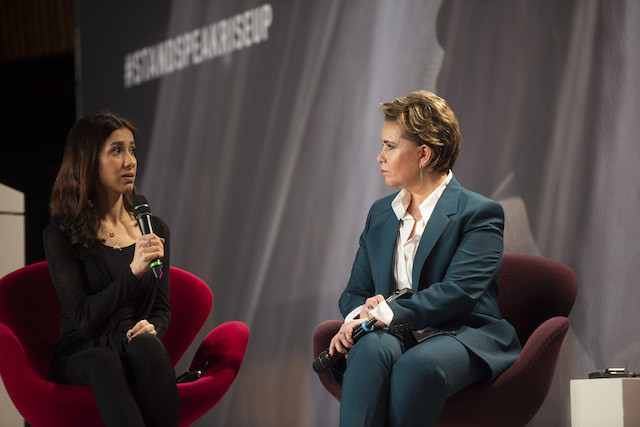In autumn 2018, Nadia Murad and Dr Denis Mukwege were both awarded the Nobel Peace Prize for their “efforts to end the use of sexual violence as a weapon of war and armed conflict,” according to the Nobel committee announcement. Both are currently in Luxembourg participating in the conference.
Murad was one of the survivors to take centre stage in a plenary led by Grand Duchess Maria Teresa on 26 March. Murad is an Iraqi Yazidi who was kidnapped in 2014 from her hometown of Kocho and suffered brutal violence, including rape. In a later workshop she explained how the atrocities are still tangible. Earlier this month, she participated in the exhumation of the first mass grave containing Yazidi victims in Kocho. “They recently announced the defeat of Isis in Syria,” she added, “but there are still more than 2,500 missing Yazidi women. Where are they?”
During the plenary, she urged for the international community to work together to seek justice. “It has been almost five years since the Yazidi genocide took place, since sexual slavery took place. We had to emigrate while to this day the terrorists still live there…Isis is not new, the crisis is not new, it happened in the past, so why not find solutions to these problems?”
Although Murad has spoken with other survivors since her experience, she said it still isn’t easy for her to speak to the public. “It’s not our dream as survivors, but the terrorists force us to speak about these stories.”
“A weapon of mass destruction”
Iryna Dovhan, member of the Global Network of Victims and Survivors to End Wartime Rape (SEMA), says it was especially because of three women in her life--her daughter, granddaughter and daughter-in-law--that she has found the courage to speak out about sexual violence. In 2014, she was abducted by pro-Russian insurgents and tortured for five days, at one point made to wear a sign reading, “She kills our children”. Passers-by further humiliated her. “The region was plunged in fear, people were forced to stay silent in occupied territories…Sexual violence is truly a weapon of mass destruction.”

Photo: Anthony Dehez
In her case, a photo of her, published in The New York Times, “saved my life”, but Dovhan is still haunted by those who were tortured or killed at that time in the Ukraine.
Building the survivor network
Aline Munezero was forced to leave Burundi over three years ago. She says she found strength through herself but also was inspired by fellow Burundian Marguerite Barankitse, activist and founder of Maison Shalom, Oasis of Peace, who also attended the conference.
“Despite the fact that the international community doesn’t talk about Burundi and that hurts me deeply, as long as I’m alive I’ll stand and fight against indignity and denounce my aggressors,” she said.
Colombian Fulvia Chunganá Medina also found comfort in meeting others who had stories similar to her own. Medina was four months pregnant when she was the victim of sexual violence but lost her child due to an STD she contracted as a result of the violence. “Hearing similar stories to mine, working with networks of associations…has empowered me. What has been done to us is very serious, and we need to make our voices heard, because what is not told does not exist.”

Ekhlas Khudhur Bajoo, right, clapping with the audience. Photo: Anthony Dehez
Another young Iraqi Yazidi, Ekhlas Khudhur Bajoo, received a round of applause from the packed room. “Why am I smiling?” she asked. “The reason is you, for the humanity you represent. Humanity is the strongest weapon we have.”
At the end of the main plenary, Grand Duchess Maria Teresa thanked the survivors for sharing their stories, calling them her “big sisters”. She added: “You are not alone anymore. We are here with you, going hand in hand to fight for your legitimate rights.”
For more information on the 27 March programme, visit the Stand Speak Rise Up website.
